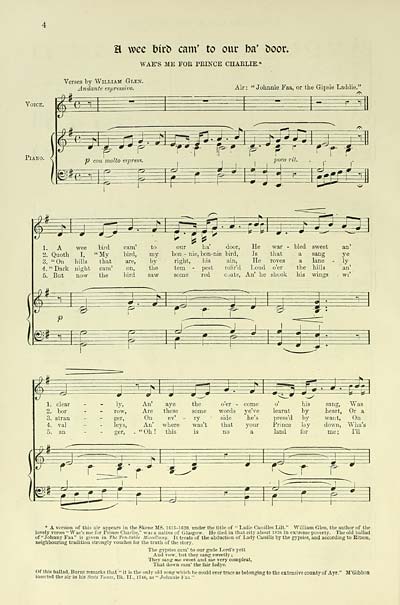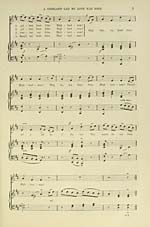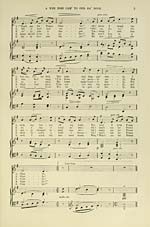Glen Collection of printed music > Printed music > Minstrelsy of Scotland
(24) Page 4 - Wee bird cam' to our ha' door
Download files
Complete book:
Individual page:
Thumbnail gallery: Grid view | List view

a wee birb cant' to our ba' boor.
WAE'S ME FOB PRINCE CHAKLIE.*
Voice.
Verses by William Glen.
Andante espressivo.
Air: " Jolinnie Faa, or the Gipsie Laddie."
/TV
NO. <
V
p con molto espress.
m^
^
i^i:
^
rff:
i
^
2±:
^m
^
1. A
2. Quotli
3. "On
4. "Dark
5. But
wee
I,
hills
night
now
bird
"My
that
cam'
the
cam
bird,
are,
on,
bird
to our ha' door,
my bon - nie, bon-nie bird,
by right, his ain,
the tern - pest roar'd
saw some red coats,
He war - bled sweet
Is that a sang
He roves a lane
Loud o'er the hills
An' he shcolc his wings
an
ye
h
an'
wi'
* A version of this air appears in the Skene MS. 1615-1620, under the title of " Ladie Cassilles Lilt." ^VilIiam Glen, the author of the
lovely verses *' Wae's me for Prince Charlie," was a native of Glasgow. He died in that city about 1824 in extreme poverty. The old ballad
of "Johnny Faa" is given in The Tea-table Miscellany. It treats of the abduction of Lady Cassilis by the gypsies, and according to Ritson,
neighbouring tradition strongly vouches for the truth of the story.
The gypsies cam' to our gude Lord's yett
And vow. but they sang sweetly;
They sang ^ae sweet and sae very compleat.
That down cam' the fair ladye.
Of this ballad. Burns remarks that " it is the only old song wliich he could ever trace as belonging to the extensive county of Ayr." M'Gibbon
inserted the air in his Scots Tunes, Bk. II., 1746, as " Johnnie l"aa."
WAE'S ME FOB PRINCE CHAKLIE.*
Voice.
Verses by William Glen.
Andante espressivo.
Air: " Jolinnie Faa, or the Gipsie Laddie."
/TV
NO. <
V
p con molto espress.
m^
^
i^i:
^
rff:
i
^
2±:
^m
^
1. A
2. Quotli
3. "On
4. "Dark
5. But
wee
I,
hills
night
now
bird
"My
that
cam'
the
cam
bird,
are,
on,
bird
to our ha' door,
my bon - nie, bon-nie bird,
by right, his ain,
the tern - pest roar'd
saw some red coats,
He war - bled sweet
Is that a sang
He roves a lane
Loud o'er the hills
An' he shcolc his wings
an
ye
h
an'
wi'
* A version of this air appears in the Skene MS. 1615-1620, under the title of " Ladie Cassilles Lilt." ^VilIiam Glen, the author of the
lovely verses *' Wae's me for Prince Charlie," was a native of Glasgow. He died in that city about 1824 in extreme poverty. The old ballad
of "Johnny Faa" is given in The Tea-table Miscellany. It treats of the abduction of Lady Cassilis by the gypsies, and according to Ritson,
neighbouring tradition strongly vouches for the truth of the story.
The gypsies cam' to our gude Lord's yett
And vow. but they sang sweetly;
They sang ^ae sweet and sae very compleat.
That down cam' the fair ladye.
Of this ballad. Burns remarks that " it is the only old song wliich he could ever trace as belonging to the extensive county of Ayr." M'Gibbon
inserted the air in his Scots Tunes, Bk. II., 1746, as " Johnnie l"aa."
Set display mode to: Large image | Transcription
Images and transcriptions on this page, including medium image downloads, may be used under the Creative Commons Attribution 4.0 International Licence unless otherwise stated. ![]()
| Special collections of printed music > Glen Collection of printed music > Printed music > Minstrelsy of Scotland > (24) Page 4 - Wee bird cam' to our ha' door |
|---|
| Permanent URL | https://digital.nls.uk/91378406 |
|---|
| Description | Scottish songs and music of the 18th and early 19th centuries, including music for the Highland bagpipe. These are selected items from the collection of John Glen (1833 to 1904). Also includes a few manuscripts, some treatises, and other books on the subject. |
|---|
| Description | The Glen Collection and the Inglis Collection represent mainly 18th and 19th century Scottish music, including Scottish songs. The collections of Berlioz and Verdi collected by bibliographer Cecil Hopkinson contain contemporary and later editions of the works of the two composers Berlioz and Verdi. |
|---|

